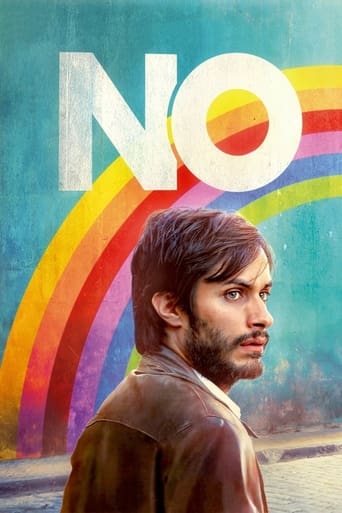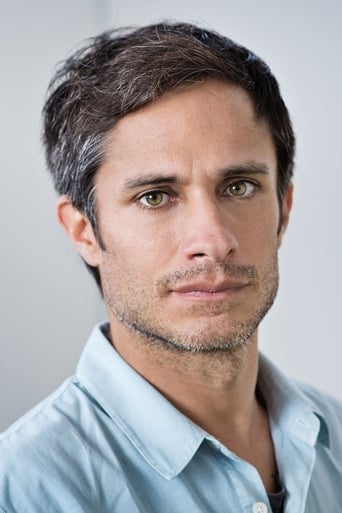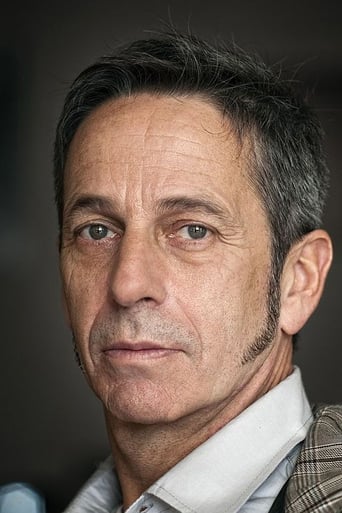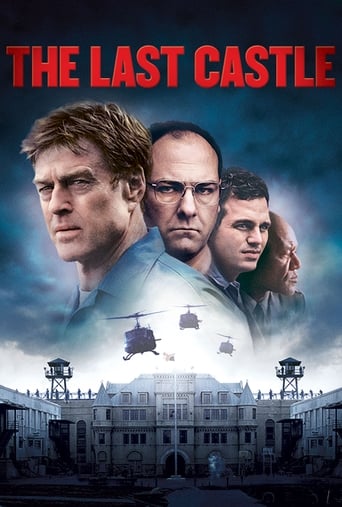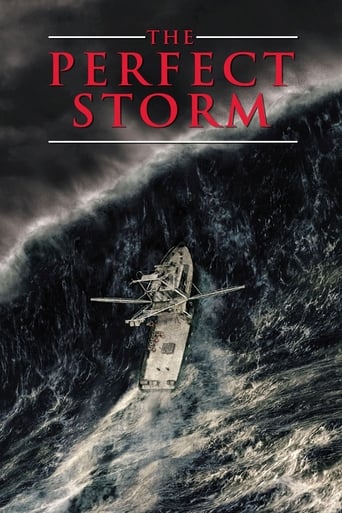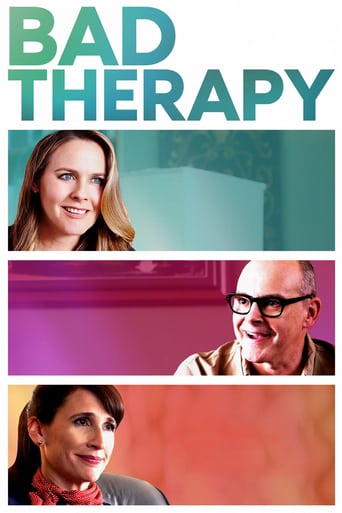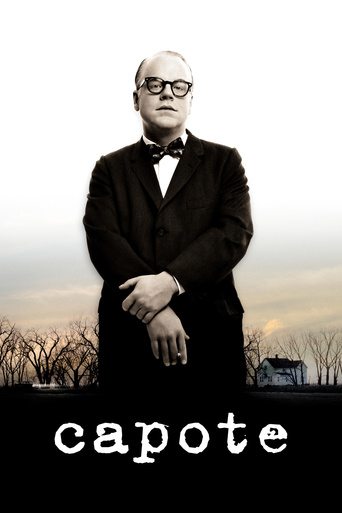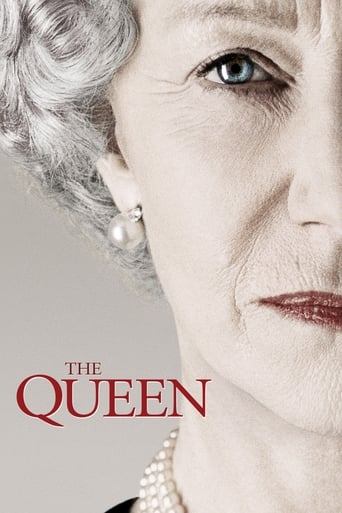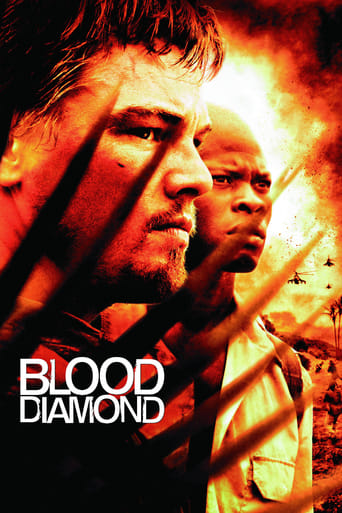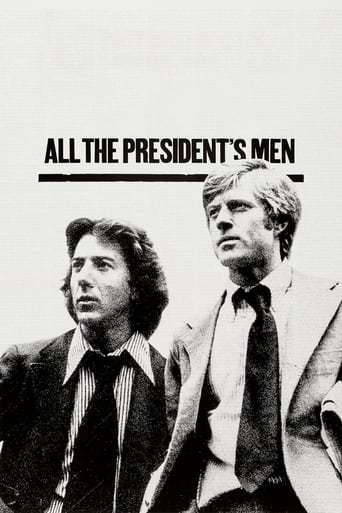No (2013)
In 1988, Chilean military dictator Augusto Pinochet, due to international pressure, is forced to call a plebiscite on his presidency. The country will vote ‘Yes’ or ‘No’ to Pinochet extending his rule for another eight years. Opposition leaders for the ‘No’ vote persuade a brash young advertising executive, René Saavedra, to spearhead their campaign. Against all odds, with scant resources and while under scrutiny by the despot’s minions, Saavedra and his team devise an audacious plan to win the election and set Chile free.
Watch Trailer
Cast


Similar titles
Reviews
If the ambition is to provide two hours of instantly forgettable, popcorn-munching escapism, it succeeds.
When a movie has you begging for it to end not even half way through it's pure crap. We've all seen this movie and this characters millions of times, nothing new in it. Don't waste your time.
The movie's neither hopeful in contrived ways, nor hopeless in different contrived ways. Somehow it manages to be wonderful
It is neither dumb nor smart enough to be fun, and spends way too much time with its boring human characters.
This is a well-made, stylistically heavy, slightly whimsical view of the the 1988 plebiscite to unseat Pinochet as Chile's autocratic military ruler. The first thing to say is that as a period piece, the late 80's are rendered in all their grainy, blotchy glory using what I can only assume is technology from that time, and while at times this can be a bit off-putting (the wobbly camera work is reminiscent of "found footage" type movies) eventually it becomes just part of the furniture.It is also a satirical look at the advertising industry, not just in Chile, but in general. One of the leading lights of the industry in Chile is Gael Garcia Bernal's character who is approached to run the No campaign. He applies all of his cynical abilities in selling "No" as a product to the undecided or the non-voters, much to the disgust of those who have suffered brutally at the hands of Pinochet's regime. He is also pitched against the owner of the advertising agency he works for who decides to work for the Yes campaign.We get a very narrow view of the plebiscite here. There's no real look at how all of the political parties (12 or so) that are against Pinochet all managed to unite for the single cause. The focus is very much on the campaign itself and the pressure put on the campaigners by the Government and the Yes side. The scenes of the protests and riots are brilliantly shot, mixing old newsreel with staged shots.There are plenty of funny moments too, particularly when they are first trying to decide on a theme for the No campaign and the ideas they are coming up with are laughable.Well worth a look.
No is an interesting political film, based on real events in 80s Chile. A referendum was held, giving citizens the choice between dictator Augusto Pinochet (Yes/Si) or hold democratic elections (No). Each side is given 15 minutes a day to air campaign advertisements. René Saavedra is hired to lead these productions for the No side, but has unconventional ideas. What if they sold democracy like a product on TV? Happiness, music videos, comedy, unrelated images...along with exposure of censorship and war crimes.Its an odd approach, and morally questionable. Even if it works, is it an ethical path to democracy? Is it what the lowest-common-denominator deserves? Its a fascinating analysis on the human psyche. It amazed me that these ridiculous, 80s-cliche videos were actually on TV. Its well-acted, and portrayed the era well. However, I thought they spent too much time on René, especially with his family. I didn't feel anything towards his ex-wife and kid. His actions outside the studio don't particularly contribute to his character. I wish they spent more time on the creation of the ads and the politics. Heck, it could have been cut out, as I think the 2 hour film is kinda slow.I don't love it, I don't hate it, it was alright. If you like the genre, sure. Its a one-and-done for me. I'd have preferred a true documentary.
In 1988, fifteen years into his reign as President of Chile, General Augusto Pinochet agreed to allow the people of his nation to hold a national referendum, leaving it up to them to determine whether or not they wanted him to remain as their leader for another eight years. On the surface, this might have seemed like a turn toward democracy for a man who came to power as a result of a military coup and who ruled his nation with an iron fist - sending many dissidents to prison and to their deaths - but many who were opposed to him eyed the elections with a great deal of skepticism and distrust, believing that the vote would be rigged and that his preordained victory would only further strengthen his grip on power and, simultaneously, enhance his image in the eyes of the world.But hold the election the nation did, and it is against this backdrop that the movie "No" is set. Gael Garcia Bernal stars as Rene Saavedra, a divorced advertising executive who lives a profitable and comfortable life with his young son, Simon. Hitherto, he has remained largely apolitical in a country where to voice an opinion on the government or its leaders can put one's own life and freedom in jeopardy (his ex is herself a leftist activist who often finds herself abused and imprisoned for her actions). But when the plebiscite is announced, Rene, somewhat hesitantly at first, agrees to work for the No Campaign, bringing his expertise on advertising for the first time into the realm of politics.While most of the people involved in the campaign want to take this opportunity to expose the horrors of the regime through a hard-hitting series of 15-minute ads, Rene argues instead for a more upbeat, feel-good approach on the theory that people are more likely to respond positively to something that makes them feel happy than something that makes them feel outraged or depressed. The result is a series of TV spots so impossibly bland and innocuous - filled with deliriously happy performers dancing and singing a jingle - that they might as well be selling toothpaste. And I guess that's one of the points of "No" - that in a consumer-conscious society even freedom and democracy eventually become commodities like everything else and can be sold as such.Written by Pedro Peirano and directed by Pablo Larrain, "No" is of more interest as a historical and social document than as a drama, since its characters remain largely superficial throughout. And while the narrative earns points for resisting the temptation to overdramatize an already highly volatile situation, the perhaps inevitable price of that restraint is a picture that actually feels UNDER-dramatized at times. However, the bravery of these individuals in the face of some obvious attempts at intimidation does shine through. In order to more seamlessly blend the action of the story with actual archival footage from the era in which it's set, the movie has been given a deliberately grainy, over-lit appearance by cinematographer Sergio Armstrong that helps to heighten its authenticity.Not quite as emotionally powerful as one might wish it to be, "No" is, nevertheless, a true-life tale of a national uprising well worth paying heed to.
With its opening titles immediately establishing how it's all about a "yes vs. no" scenario, it then swiftly answers it with the title. But the result isn't the interesting factor, what's fascinating is how they make important and competitive media and that was enough to get me intrigued by No despite not knowing any historical context. Despite the films own attractive advertising campaign, it surprised me to find that the film was shot entirely on video tape rather than film. While this does echo the limitations of an independent filmmaker in the late 80s, it's very difficult for this style to feel cinematic at all. In fact, it feels more like cheaply filming a rehearsal or the raw dogme films of the late 90s. It requires a greater attention to detail and very natural performances for it to work and fortunately, it's a film all about attention to detail and analysing the little things.With its use of displaying glossy advertisements on the television screens, it's deliberately peeling back that gloss for a more authentic representation of what the media is trying to say beneath the shine. Despite this very interesting style, the story is quite archetypal with the hero going through the whole journey formula. Fortunately the film is never sentimental or contrived but it has a very frustrating use of jump cuts, where a conversation goes for at least 4 locations. What they're saying is fascinating but the quick cutting completely messes with the pace and momentum of the film. These montages are justified during the scenes of making the ads but otherwise No does struggle to get into the characters and feel as cathartic as it could be. This is the last of the Oscar movies in 2012 that I want to see unless one of the documentaries, foreign or animated films surprises us with a win.7/10

